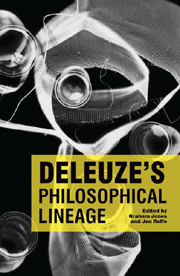Book contents
- Frontmatter
- Contents
- Acknowledgements
- List of Abbreviations
- Introduction: Into the Labyrinth
- 1 Plato
- 2 John Duns Scotus
- 3 G. W. F. Leibniz
- 4 David Hume
- 5 Immanuel Kant
- 6 Solomon Maimon
- 7 G. W. F. Hegel
- 8 Karl Marx
- 9 Hoëne Wronski and Francis Warrain
- 10 Bernhard Riemann
- 11 Gabriel Tarde
- 12 Sigmund Freud
- 13 Henri Bergson
- 14 Edmund Husserl
- 15 A. N. Whitehead
- 16 Raymond Ruyer
- 17 Martin Heidegger
- 18 Pierre Klossowski
- 19 Albert Lautman
- 20 Gilbert Simondon
- Bibliography
- Notes on Contributors
- Index
18 - Pierre Klossowski
Published online by Cambridge University Press: 12 September 2012
- Frontmatter
- Contents
- Acknowledgements
- List of Abbreviations
- Introduction: Into the Labyrinth
- 1 Plato
- 2 John Duns Scotus
- 3 G. W. F. Leibniz
- 4 David Hume
- 5 Immanuel Kant
- 6 Solomon Maimon
- 7 G. W. F. Hegel
- 8 Karl Marx
- 9 Hoëne Wronski and Francis Warrain
- 10 Bernhard Riemann
- 11 Gabriel Tarde
- 12 Sigmund Freud
- 13 Henri Bergson
- 14 Edmund Husserl
- 15 A. N. Whitehead
- 16 Raymond Ruyer
- 17 Martin Heidegger
- 18 Pierre Klossowski
- 19 Albert Lautman
- 20 Gilbert Simondon
- Bibliography
- Notes on Contributors
- Index
Summary
Repetition as a conduct and as a point of view concerns non-exchangeable and non-substitutable singularities. Reflections, echoes, doubles and souls do not belong to the domain of resemblance or equivalence.
Gilles Deleuze, Difference and Repetition
Deleuze's Bibliography
At the end of original French edition of Difference and Repetition Deleuze's bibliography divides itself into three columns indicating the name of the author, the work cited and, in the final column, ‘the sense in which the work is cited’ (DR 334). Of the hundred and twenty-three authors listed, thirty-five are cited explicitly in relation to the motif of repetition. These include major thinkers for whom repetition plays a key role in their philosophy, for example Bergson, Derrida, Foucault, Freud, Kierkegaard, Lacan, Marx and Nietzsche. Three well-known names are cited, along with a number of other figures, as thinkers of repetition in the unconscious. They are: Derrida, Freud, and Lacan, and are accompanied by names such as Ferdinand Alquié, Sandor Ferenczi, Serge Leclaire and Jacques-Alain Miller. Marx is cited along with writers such as Pierre-Simon Ballanche, Joachim de Flore, Harold Rosenberg and Giovanni-Battista Vico as thinkers of repetition in history. A number of literary writers and essayists are also cited in relation to repetition (including, amongst others, Butor, Joyce, Klossowski, Péguy and Proust). Along with these proper names a diverse range of concepts are associated with repetition throughout this bibliographical list, most obviously those already mentioned – difference, the unconscious and history – but also memory, habit, freedom, chaos, phantasm and equality.
- Type
- Chapter
- Information
- Deleuze's Philosophical Lineage , pp. 339 - 355Publisher: Edinburgh University PressPrint publication year: 2009



